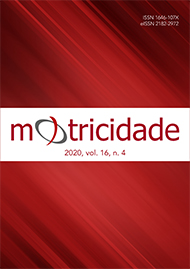Fitness instructors role on exercise adherence in Portugal: the importance of need-supportive behaviors and motivational climates
DOI:
https://doi.org/10.6063/motricidade.21120Abstract
The present study aimed to examine the association between fitness instructors’ interpersonal behaviors and motivational climates and exercise adherence. Two studies were conducted: in the first study, the effect of need-supportive and need-thwarting behaviors on basic psychological needs, and consequently on exercise adherence was analyzed; in the second study, the effect of ego and task-involving motivational climates on basic psychological needs, and consequently on exercise adherence was examined. Data was collected from several exercisers engaged in fitness activities in several gym and health clubs in Portugal. The results showed a positive association between need-supportive behaviors, task-involving climate, and basic psychological needs. These needs were respectively positively and significantly correlated with exercise adherence. Contrarily, need-thwarting behaviors displayed a negative, while ego-involving climates no association at all, with basic psychological needs. Overall, the data clearly shows an association between the way the fitness instructor is perceived by the exerciser and the number of accesses that the exerciser will have in the six months following the moment of the initial assessment. Therefore, fitness instructors have a considerable capacity to positively influence the exerciser's adherence, by creating a supportive environment during the training session.
Downloads
Published
Issue
Section
License
The authors of submitted manuscripts must transfer the full copyright to Journal Motricidade / Sílabas Didáticas Editions. Granting copyright permission allows the publication and dissemination of the article in printed or electronic formats, and copyrights start at the moment the manuscript is accepted for publication. It also allows Journal Motricidade to use and commercialise the article in terms of licensing, lending or selling its content to indexation/abstracts databases and other entities.
According to the terms of the Creative Commons licence, authors may reproduce a reasonable number of copies for personal or professional purposes, but without any economic gain. SHERPA/RoMEO allows authors to post a final digital copy (post-printing version) of the article on their websites or on their institutions' scientific repository.


